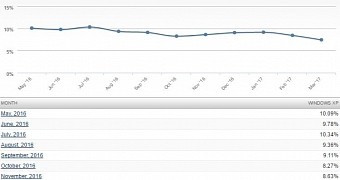Believe it or not, Windows XP is still powering 7.44 percent of the world’s computers, even though it’s already 15 years old and it no longer receives support since April 2014.
NetMarketShare data reveals that in March 2017, Windows XP dropped approximately 1 percent from the previous month, but remained the third most popular desktop operating system in the world after Windows 7 and Windows 10.
Truth be told, the decline of Windows XP seems to happen at a faster pace these days, but this ancient operating system somehow sticks around despite the obvious risks of running a platform that no longer receives security updates from its vendor.
The evolution of Windows XP’s market share shows that even though it has already reached end of support, it remains the preferred choice for an important share of users, with some months even bringing a substantial increase in market share.
Months of recovery
Back in July 2016, for example, Windows XP posted growth from 9.78 percent to 10.34 percent, while a new recovery was experienced in late 2016 when it registered increases for two consecutive months from 8.63 percent to 9.17 percent.
According to Microsoft’s estimates, there are 1.5 billion Windows PCs out there, so if these figures are accurate, it means there are more than 111 million computers still running Windows XP.
This is worrying to say the least, especially because many of them are being used by governments, departments, organizations or agencies across the world, with such systems often being spotted in airports, police stations, or hospitals.
Without a doubt, Windows XP won’t disappear overnight, but hopefully, no other increase in market share would be experienced in the coming months and the gradual decline would accelerate.
As for the reasons why Windows XP remains so popular these days, it’s mostly because upgrading to a newer operating system is seen as either a too expensive move for companies, as hardware upgrades are also needed, or because its successors aren’t considered worthy alternatives for home users.

 14 DAY TRIAL //
14 DAY TRIAL //